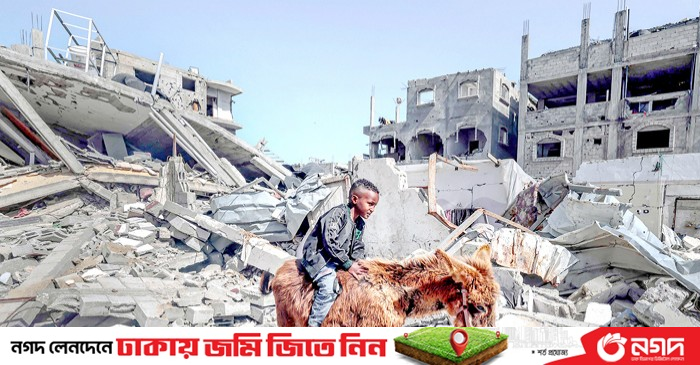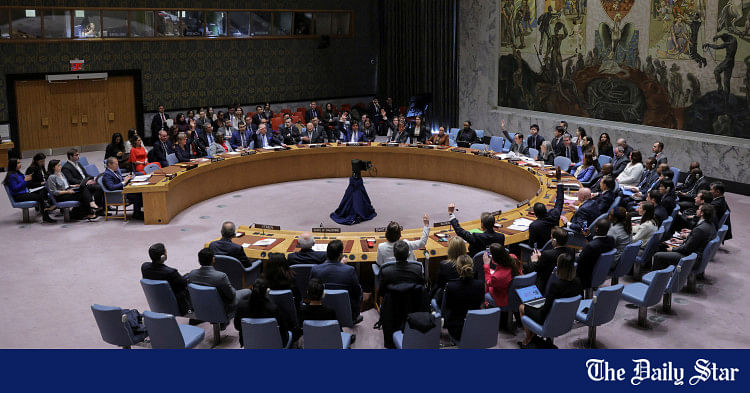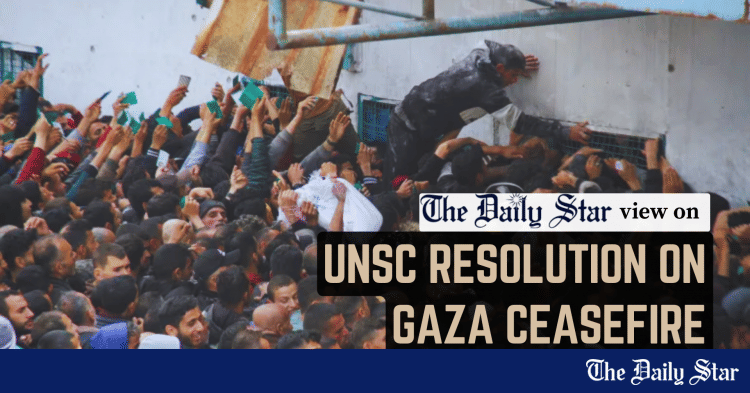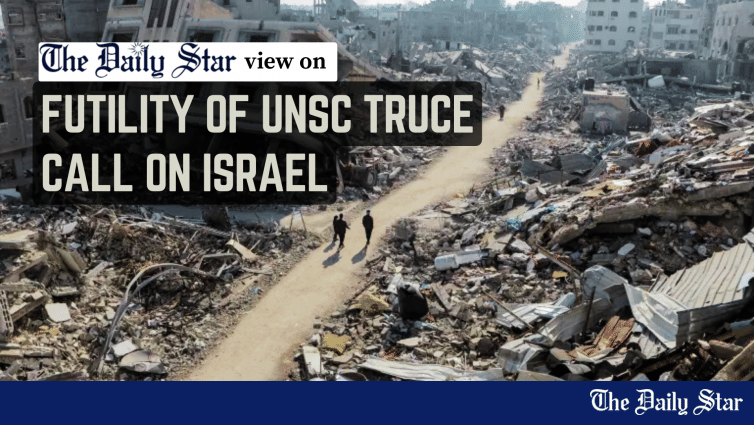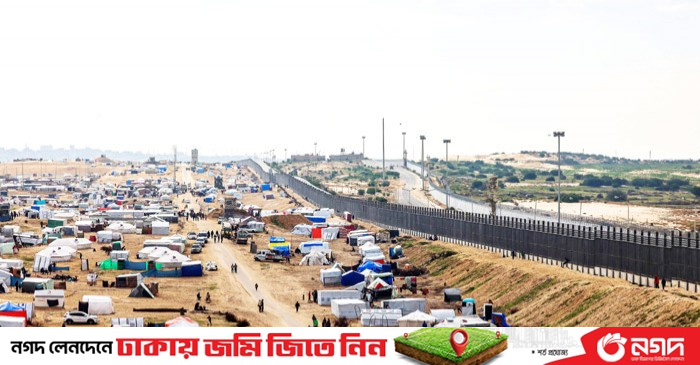Saif
Senior Member
- Messages
- 17,408
- Likes
- 8,373
- Nation

- Residence

- Axis Group


Israel’s Trojan Horse
PIERS allow things to come in. They allow things to go out. And Israel, which has no intention of halting its murderous siege of Gaza...
 www.newagebd.net
www.newagebd.net
Israel’s Trojan Horse
Chris Hedges | Published: 00:00, Mar 21,2024

Israel’s Trojan Horse. — by Mr Fish
PIERS allow things to come in. They allow things to go out. And Israel, which has no intention of halting its murderous siege of Gaza, including its policy of enforced starvation, appears to have found a solution to its problem of where to expel the 2.3 million Palestinians.
If the Arab world will not take them, as secretary of state Antony Blinken proposed during his first round of visits after October 7, the Palestinians will be cast adrift on ships. It worked in Beirut in 1982 when some eight and a half thousand Palestine Liberation Organisation members were sent by sea to Tunisia and another two and a half thousand ended up in other Arab states. Israel expects that the same forced deportation by sea will work in Gaza.
Israel, for this reason, supports the ‘temporary pier’ the Biden administration is building, to ostensibly deliver food and aid to Gaza — food and aid whose ‘distribution’ will be overseen by the Israeli military.
‘You need drivers that don’t exist, trucks that don’t exist feeding into a distribution system that doesn’t exist,’ Jeremy Konyndyk, a former senior aid official in the Biden administration, and now president of the Refugees International aid advocacy group told The Guardian.
This ‘maritime corridor’ is Israel’s Trojan Horse, a subterfuge to expel Palestinians. The small shipments of seaborne aid, like the food packets that have been air dropped, will not alleviate the looming famine. They are not meant to.
Five Palestinians were killed and several others injured when a parachute carrying aid failed and crashed onto a crowd of people near Gaza City’s Shati refugee camp.
‘Dropping aid in this way is flashy propaganda rather than a humanitarian service,’ the media office of the local government in Gaza said. ‘We previously warned it poses a threat to the lives of citizens in the Gaza Strip, and this is what happened today when the parcels fell on the citizens’ heads.’
If the US or Israel were serious about alleviating the humanitarian crisis, the thousands of trucks with food and aid currently at the southern border of Gaza would be allowed to enter any of its multiple crossings. They are not. The ‘temporary pier,’ like the air drops, is ghoulish theater, a way to mask Washington’s complicity in the genocide.
Israeli media reported the building of the pier was due to pressure by the United Arab Emirates, which threatened Israel with ending a land corridor trade route it administers in collusion with Saudi Arabia and Jordan, to bypass Yemen’s naval blockade.
The Jerusalem Post reported it was prime minister Benjamin Netanyahu who proposed the construction of the ‘temporary pier’ to the Biden administration.
Israeli defense minister Yoav Gallant, who has called Palestinians ‘human animals’ and advocated a total siege of Gaza, including cutting off electricity, food, water and fuel, lauded the plan, saying ‘it is designed to bring aid directly to the residents and thus continue the collapse of Hamas’s rule in Gaza.’
‘Why would Israel, the engineer of the Gaza famine, endorse the idea of establishing a maritime corridor for aid to address a crisis it initiated and is now worsening?’ writes Tamara Nassar in an article titled ‘What’s the Real Purpose of Biden’s Gaza Port?’ in The Electronic Intifada. ‘This might appear paradoxical if one were to assume that the primary aim of the maritime corridor is to deliver aid.’
When Israel offers a gift to the Palestinians you can be sure it is a poison apple. That Israel got the Biden administration to construct the pier is one more example of the inverted relationship between Washington and Jerusalem, where the Israel lobby has bought off elected officials in the two ruling parties.
Oxfam in a March 15 report accuses Israel of actively hindering aid operations in Gaza in defiance of the orders by the International Court of Justice. It notes that 1.7 million Palestinians, some 75 per cent of the Gaza population, are facing famine and two-thirds of the hospitals and over 80 per cent of all health clinics in Gaza are no longer operable. The majority of people, the report reads, ‘have no access to clean drinking water’ and ‘sanitation services are not functioning.’
The report reads: ‘The conditions we have observed in Gaza are beyond catastrophic, and we have not only seen failure by Israeli authorities to meet their responsibility to facilitate and support international aid efforts, but in fact seen active steps being taken to hinder and undermine such aid efforts. Israel’s control of Gaza continues to be characterised by deliberate restrictive actions that have led to a severe and systemic dysfunctionality in the delivery of aid. Humanitarian organisations operational in Gaza are reporting a worsening situation since the International Court of Justice imposed provisional measures in light of the plausible risk of genocide, with intensified Israeli barriers, restrictions and attacks against humanitarian personnel. Israel has maintained a ‘convenient illusion of a response’ in Gaza to serve its claim that it is allowing aid in and conducting the war in line with international laws.’
Oxfam says Israel employs ‘a dysfunctional and undersized inspection system that keeps aid snarled up, subjected to onerous, repetitive and unpredictable bureaucratic procedures that are contributing to trucks being stranded in giant queues for 20 days on average.’ Israel, Oxfam explains, rejects ‘items of aid as having ‘dual (military) use,’ banning vital fuel and generators entirely along with other items essential for a meaningful humanitarian response such as protective gear and communications kit.’ Rejected aid, ‘must go through a complex ‘pre-approval’ system or end up being held in limbo at the Al Arish warehouse in Egypt.’ Israel has also ‘cracked down on humanitarian missions, largely sealing off northern Gaza, and restricting international humanitarian workers’ access not only into Gaza, but Israel and the West Bank including East Jerusalem too.’
Israel has allowed 15,413 trucks into Gaza during the past 157 days of war. Oxfam estimates that the population of Gaza needs five times that number. Israel allowed 2,874 trucks in February, a 44 per cent reduction from the previous month. Before October 7, 500 aid trucks entered Gaza daily.
Israeli soldiers have also killed scores of Palestinians attempting to receive aid from trucks in more than two dozen incidents. These attacks include the killing of at least 21 Palestinians, and the wounding of 150, on March 14, when Israeli forces fired on thousands of people in Gaza City. The same area had been targeted by Israeli soldiers hours earlier.
‘Israel’s assault has caught Gaza’s own aid workers and international agencies’ partners inside a ‘practically uninhabitable’ environment of mass displacement and deprivation, where 75 per cent of solid waste is now being dumped in random sites, 97 per cent of groundwater made unfit for human use, and the Israeli state using starvation as a weapon of war,’ Oxfam says.
There is no place in Gaza, Oxfam notes, that is safe ‘amid the forcible and often multiple displacements of almost the entire population, which makes the principled distribution of aid unviable, including agencies’ ability to help repair vital public services at scale.’
Oxfam blasts Israel for its ‘disproportionate’ and ‘indiscriminate’ attacks on ‘civilian and humanitarian assets’ as well as ‘solar, water, power and sanitation plants, UN premises, hospitals, roads, and aid convoys and warehouses, even when these assets are supposedly ‘deconflicted’ after their coordinates have been shared for protection.’
The health ministry in Gaza said Monday that at least 31,726 people have been killed since the Israeli assault began five months ago. The death toll includes at least 81 deaths in the previous 24 hours, a ministry statement said, adding that 73,792 people have been wounded in Gaza since October 7. Thousands more are missing, many buried under the rubble.
None of these Israeli tactics will be altered with the building of a ‘temporary pier.’ In fact, given the pending ground assault on Rafah, where 1.2 million displaced Palestinians are crowded in tent cities or camped out in the open air, Israel’s tactics will only get worse.
Israel, by design, is creating a humanitarian crisis of such catastrophic proportions, with thousands of Palestinians killed by bombs, shells, missiles, bullets, starvation and infectious diseases, that the only option will be death or deportation. The pier is where the last act in this gruesome genocidal campaign will be played out as Palestinians are herded by Israeli soldiers onto ships.
How appropriate that the Biden administration, without whom this genocide could not be carried out, will facilitate it.
ScheerPost.com, March 17. Chris Hedges is a Pulitzer prize-winning journalist who was a foreign correspondent for 15 years for the New York Times.
Chris Hedges | Published: 00:00, Mar 21,2024
Israel’s Trojan Horse. — by Mr Fish
PIERS allow things to come in. They allow things to go out. And Israel, which has no intention of halting its murderous siege of Gaza, including its policy of enforced starvation, appears to have found a solution to its problem of where to expel the 2.3 million Palestinians.
If the Arab world will not take them, as secretary of state Antony Blinken proposed during his first round of visits after October 7, the Palestinians will be cast adrift on ships. It worked in Beirut in 1982 when some eight and a half thousand Palestine Liberation Organisation members were sent by sea to Tunisia and another two and a half thousand ended up in other Arab states. Israel expects that the same forced deportation by sea will work in Gaza.
Israel, for this reason, supports the ‘temporary pier’ the Biden administration is building, to ostensibly deliver food and aid to Gaza — food and aid whose ‘distribution’ will be overseen by the Israeli military.
‘You need drivers that don’t exist, trucks that don’t exist feeding into a distribution system that doesn’t exist,’ Jeremy Konyndyk, a former senior aid official in the Biden administration, and now president of the Refugees International aid advocacy group told The Guardian.
This ‘maritime corridor’ is Israel’s Trojan Horse, a subterfuge to expel Palestinians. The small shipments of seaborne aid, like the food packets that have been air dropped, will not alleviate the looming famine. They are not meant to.
Five Palestinians were killed and several others injured when a parachute carrying aid failed and crashed onto a crowd of people near Gaza City’s Shati refugee camp.
‘Dropping aid in this way is flashy propaganda rather than a humanitarian service,’ the media office of the local government in Gaza said. ‘We previously warned it poses a threat to the lives of citizens in the Gaza Strip, and this is what happened today when the parcels fell on the citizens’ heads.’
If the US or Israel were serious about alleviating the humanitarian crisis, the thousands of trucks with food and aid currently at the southern border of Gaza would be allowed to enter any of its multiple crossings. They are not. The ‘temporary pier,’ like the air drops, is ghoulish theater, a way to mask Washington’s complicity in the genocide.
Israeli media reported the building of the pier was due to pressure by the United Arab Emirates, which threatened Israel with ending a land corridor trade route it administers in collusion with Saudi Arabia and Jordan, to bypass Yemen’s naval blockade.
The Jerusalem Post reported it was prime minister Benjamin Netanyahu who proposed the construction of the ‘temporary pier’ to the Biden administration.
Israeli defense minister Yoav Gallant, who has called Palestinians ‘human animals’ and advocated a total siege of Gaza, including cutting off electricity, food, water and fuel, lauded the plan, saying ‘it is designed to bring aid directly to the residents and thus continue the collapse of Hamas’s rule in Gaza.’
‘Why would Israel, the engineer of the Gaza famine, endorse the idea of establishing a maritime corridor for aid to address a crisis it initiated and is now worsening?’ writes Tamara Nassar in an article titled ‘What’s the Real Purpose of Biden’s Gaza Port?’ in The Electronic Intifada. ‘This might appear paradoxical if one were to assume that the primary aim of the maritime corridor is to deliver aid.’
When Israel offers a gift to the Palestinians you can be sure it is a poison apple. That Israel got the Biden administration to construct the pier is one more example of the inverted relationship between Washington and Jerusalem, where the Israel lobby has bought off elected officials in the two ruling parties.
Oxfam in a March 15 report accuses Israel of actively hindering aid operations in Gaza in defiance of the orders by the International Court of Justice. It notes that 1.7 million Palestinians, some 75 per cent of the Gaza population, are facing famine and two-thirds of the hospitals and over 80 per cent of all health clinics in Gaza are no longer operable. The majority of people, the report reads, ‘have no access to clean drinking water’ and ‘sanitation services are not functioning.’
The report reads: ‘The conditions we have observed in Gaza are beyond catastrophic, and we have not only seen failure by Israeli authorities to meet their responsibility to facilitate and support international aid efforts, but in fact seen active steps being taken to hinder and undermine such aid efforts. Israel’s control of Gaza continues to be characterised by deliberate restrictive actions that have led to a severe and systemic dysfunctionality in the delivery of aid. Humanitarian organisations operational in Gaza are reporting a worsening situation since the International Court of Justice imposed provisional measures in light of the plausible risk of genocide, with intensified Israeli barriers, restrictions and attacks against humanitarian personnel. Israel has maintained a ‘convenient illusion of a response’ in Gaza to serve its claim that it is allowing aid in and conducting the war in line with international laws.’
Oxfam says Israel employs ‘a dysfunctional and undersized inspection system that keeps aid snarled up, subjected to onerous, repetitive and unpredictable bureaucratic procedures that are contributing to trucks being stranded in giant queues for 20 days on average.’ Israel, Oxfam explains, rejects ‘items of aid as having ‘dual (military) use,’ banning vital fuel and generators entirely along with other items essential for a meaningful humanitarian response such as protective gear and communications kit.’ Rejected aid, ‘must go through a complex ‘pre-approval’ system or end up being held in limbo at the Al Arish warehouse in Egypt.’ Israel has also ‘cracked down on humanitarian missions, largely sealing off northern Gaza, and restricting international humanitarian workers’ access not only into Gaza, but Israel and the West Bank including East Jerusalem too.’
Israel has allowed 15,413 trucks into Gaza during the past 157 days of war. Oxfam estimates that the population of Gaza needs five times that number. Israel allowed 2,874 trucks in February, a 44 per cent reduction from the previous month. Before October 7, 500 aid trucks entered Gaza daily.
Israeli soldiers have also killed scores of Palestinians attempting to receive aid from trucks in more than two dozen incidents. These attacks include the killing of at least 21 Palestinians, and the wounding of 150, on March 14, when Israeli forces fired on thousands of people in Gaza City. The same area had been targeted by Israeli soldiers hours earlier.
‘Israel’s assault has caught Gaza’s own aid workers and international agencies’ partners inside a ‘practically uninhabitable’ environment of mass displacement and deprivation, where 75 per cent of solid waste is now being dumped in random sites, 97 per cent of groundwater made unfit for human use, and the Israeli state using starvation as a weapon of war,’ Oxfam says.
There is no place in Gaza, Oxfam notes, that is safe ‘amid the forcible and often multiple displacements of almost the entire population, which makes the principled distribution of aid unviable, including agencies’ ability to help repair vital public services at scale.’
Oxfam blasts Israel for its ‘disproportionate’ and ‘indiscriminate’ attacks on ‘civilian and humanitarian assets’ as well as ‘solar, water, power and sanitation plants, UN premises, hospitals, roads, and aid convoys and warehouses, even when these assets are supposedly ‘deconflicted’ after their coordinates have been shared for protection.’
The health ministry in Gaza said Monday that at least 31,726 people have been killed since the Israeli assault began five months ago. The death toll includes at least 81 deaths in the previous 24 hours, a ministry statement said, adding that 73,792 people have been wounded in Gaza since October 7. Thousands more are missing, many buried under the rubble.
None of these Israeli tactics will be altered with the building of a ‘temporary pier.’ In fact, given the pending ground assault on Rafah, where 1.2 million displaced Palestinians are crowded in tent cities or camped out in the open air, Israel’s tactics will only get worse.
Israel, by design, is creating a humanitarian crisis of such catastrophic proportions, with thousands of Palestinians killed by bombs, shells, missiles, bullets, starvation and infectious diseases, that the only option will be death or deportation. The pier is where the last act in this gruesome genocidal campaign will be played out as Palestinians are herded by Israeli soldiers onto ships.
How appropriate that the Biden administration, without whom this genocide could not be carried out, will facilitate it.
ScheerPost.com, March 17. Chris Hedges is a Pulitzer prize-winning journalist who was a foreign correspondent for 15 years for the New York Times.

